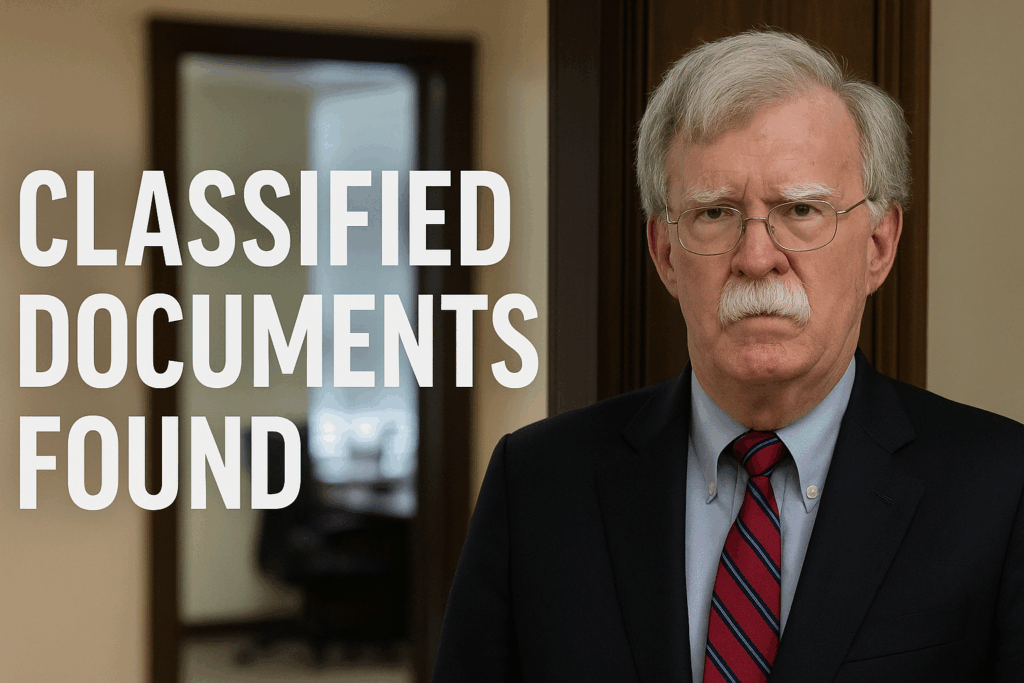Federal investigators say they recovered documents stamped “secret,” “confidential,” and “classified” during the Aug. 22 raid of former national security adviser John Bolton’s D.C. office. According to court filings made public this week. The materials allegedly include references to weapons of mass destruction, the U.S. mission to the United Nations, and a strategic communications plan. These all raise the possibility of criminal exposure for Bolton.
The newly disclosed inventory catalogs items seized from Bolton’s downtown office. Agents found “Travel memo documents with pages labeled secret.” They also recovered “U.S. Mission to the United Nations — Confidential Documents” as well as a “U.S. Government Strategic Communications Plan — Confidential Documents.” Among the materials were “Confidential Documents with (redacted) heading Weapons of Mass Destruction Classified Documents.” In addition to documents, agents removed four computers and a USB flash drive.
A simultaneous search at Bolton’s Bethesda, Maryland, residence yielded no overtly marked classified records. However, numerous electronic devices were confiscated. The warrant applications in both locations cited possible violations of statutes prohibiting unauthorized retention or transmission of national defense information and mishandling of classified records under the Espionage Act.
In one of the unsealed filings, an FBI agent wrote:
“Based on my training, experience, and education … I respectfully submit that there is probable cause to believe that evidence of the unlawful retention and transmission of classified information and National Defense Information … are located in the TARGET OFFICE.”
Bolton’s legal team has insisted the materials are innocuous relics of a long government career. His lawyer, Abbe Lowell, said the contents were “reviewed and closed years ago.” He described them as “the kinds of ordinary records … that would be kept by a 40-year career official.” Lowell added that the documents with classification markings, dating back to the period 1998–2006, pertain to Amb. Bolton’s time in the George W. Bush Administration.
Yet, the department did not publicly note, at least, whether those files had ever been declassified. This is a key question in any case involving old documents.
The investigation draws clear parallels to earlier probes of top officials. Donald Trump was indicted under the Espionage Act in a separate case for allegedly hoarding classified documents at Mar-a-Lago. That indictment was dismissed on procedural grounds. Meanwhile, President Joe Biden faced a request for classified records at his Delaware home. Prosecutors declined to bring charges in Biden’s case.
Critics and supporters alike question whether the Justice Department is applying enforcement consistently or politically. Bolton was once allied with Trump. He later became one of his fiercest critics. This shift prompted speculation that the raid might be a retaliatory action. Yet DOJ officials maintain their actions are driven by evidence. Prosecutors stated in filings: “Law enforcement is actively reviewing evidence and interviewing witnesses.”
This case rests on a sensitive balance. Too little enforcement would erode the rules governing classified material. Overzealous scrutiny could weaponize the justice system against political actors. If Bolton is charged or exonerated, the decision will signal whether the Department will hold all officials equally accountable.
Above all, transparency is essential. Much of the investigative record remains redacted to protect national security. Still, the public deserves confidence that prosecutions proceed on the basis of legal merit, not political calculation. Otherwise, in the realm of classified documents, the law risks becoming a tool rather than a standard.


